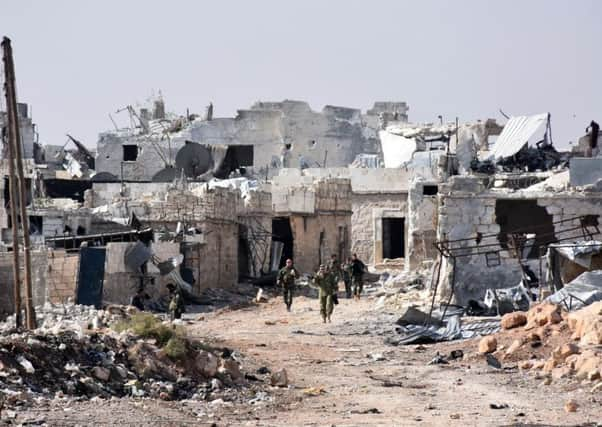Besieged areas of Aleppo are hit by fresh Russian airstrikes


According to activists, between four and ten people were killed in the strikes on Aleppo, raising concerns of a return to daily deadly violence in what is Syria’s largest city.
The offensive began hours after Russian president Vladimir Putin and US president-elect Donald Trump discussed the conflict in Syria over the phone and agreed on the need to combine efforts in the fight against what the Kremlin called their No 1 enemy – “international terrorism and extremism”.
Advertisement
Hide AdAdvertisement
Hide AdThe Obama administration has been trying for months to negotiate a ceasefire in Aleppo, a city that has become the epicentre of the war between president Bashar al-Assad and rebels fighting to topple him, some of whom receive US aid. From the militants’ side, al-Qaeda’s Syrian affiliate is fighting alongside the rebels, but the Islamic State group has no presence in Aleppo city.
Russian defence minister Sergei Shoigu said in a meeting with Mr Putin yesterday that the operation involves the aircraft carrier Admiral Kuznetsov, which made a much-publicised trip to Syria’s shores last month. He said Russian warplanes will target ammunition depots, training camps and armaments factories in the rebel-held province of Idlib and the central province of Homs. He did not immediately mention Aleppo.
Meanwhile, Syrian activists reported strikes in all three places. The Britain-based Syrian Observatory for Human Rights said missiles fired from Russian warships in the Mediterranean struck areas in Aleppo province and on the eastern edge of nearby Idlib. The Observatory’s chief, Rami Abdurrahman, said the areas hit with missiles are strongholds of jihadi groups, including the al-Qaeda affiliate known as Fatah al-Sham Front.
The Observatory and other groups said airstrikes also struck at least eight neighbourhoods in Aleppo city, killing at least ten people.
The Local Co-ordination Committees, another activist group, said the airstrikes on Aleppo killed four and wounded others. Activist Baraa al-Halaby, who is based in eastern Aleppo, said via text messages that warplanes were firing missiles and helicopters were dropping barrel bombs on the eastern part of Syria’s largest city.
“People are scared. The bombardment is intense,” he wrote.
A reporter for Syrian state television, speaking from the government-held western part of the city, said troops were preparing to attack east Aleppo from nine directions.
Ibrahim Nseir, a priest and the head of the Anglican sect in Aleppo, also speaking from the city’s west, said he could see smoke billowing from the eastern neighbourhoods as a result of the airstrikes. Sounds of warplanes flying at low altitude could be clearly heard over the phone line.
In mid-October, Russia said it would halt weeks of deadly airstrikes to allow rebels and supporters to leave eastern Aleppo. The rebels refused to take up the offer and the United Nations failed to negotiate the delivery of aid into the besieged area.
The east of the city has been contested since 2012.
Advertisement
Hide AdAdvertisement
Hide AdOn Saturday, Syrian government troops repelled a rebel offensive on the western parts of Aleppo designed to break the siege on the opposition-held east. The government siege has left an estimated 275,000 people trapped, with no aid allowed in since July.
In Geneva, meanwhile, two UN agencies said food production in Syria has shrunk to “an all-time low,” threatening to drive more people from their homes after 5.5 years of war.